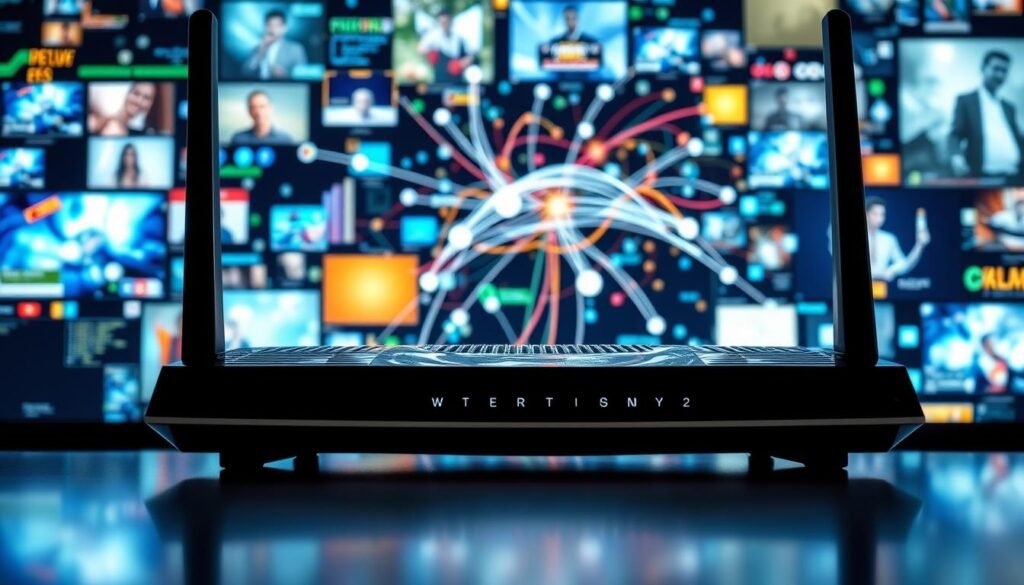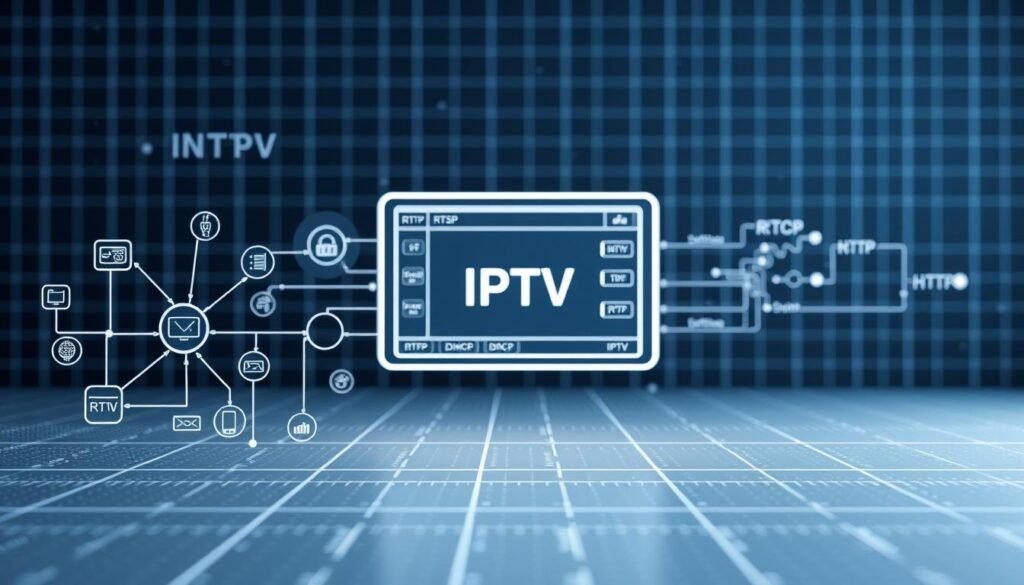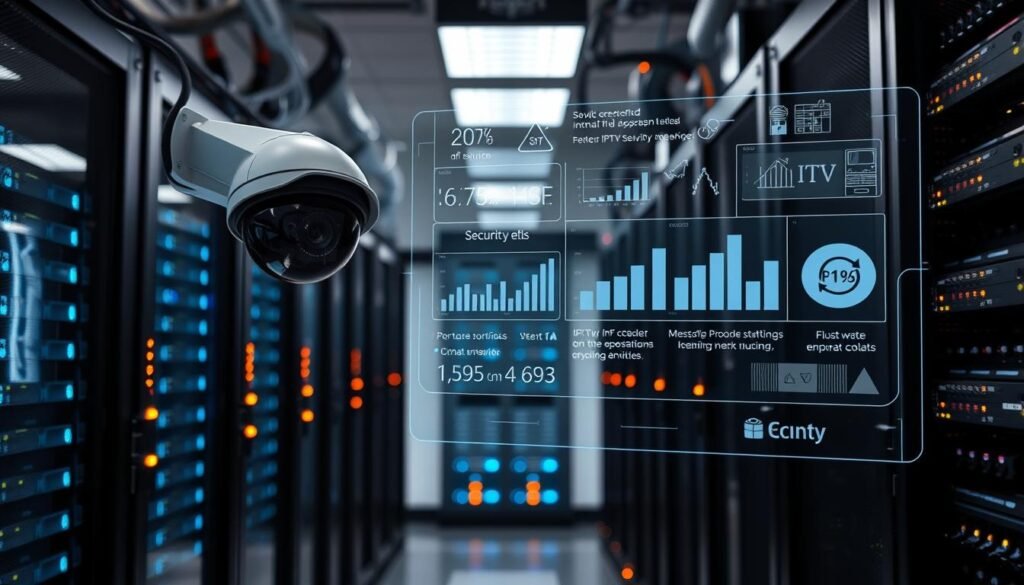Internet Protocol Television, or IPTV, is a way to send digital TV over the internet. It has changed how we watch TV, offering lots of channels and content. IPTV uses the internet to send TV channels and programs.
In the United States, IPTV is getting more popular. Many providers offer IPTV services. It lets users watch digital TV channels, including live TV and on-demand videos. IPTV is great because it offers high-quality TV over the internet, unlike traditional TV.

A sleek, modern router against a backdrop of a dynamic internet landscape. In the foreground, the router’s glossy surface reflects the interplay of light and shadow, conveying a sense of technological sophistication. In the middle ground, a tapestry of digital signals, data streams, and network visualizations swirls and dances, representing the complex infrastructure of Internet Protocol Television. The background features a vibrant, colorful array of screens, devices, and icons, symbolizing the ubiquity and interconnectedness of IPTV in the digital age. The overall composition creates a visually striking and technically accurate representation of the concept of “what is IPTV”.
IPTV is becoming more popular, especially compared to traditional TV. It’s cheaper, offers more flexibility, and works on many devices. This makes IPTV a great choice for a personalized TV experience. With its quality and internet delivery, IPTV is set to be a big part of TV’s future.
Key Takeaways
- IPTV is a method of delivering digital television content over internet protocol networks.
- IPTV offers a wide range of channels and content to viewers, including live TV and video on demand.
- IPTV is a viable alternative to traditional television broadcasting, offering high-quality digital television content over the internet.
- IPTV services are becoming increasingly popular in the United States, with many service providers offering IPTV to their customers.
- IPTV provides cost advantages, content flexibility, and multiple device support, making it an attractive option for consumers.
- IPTV is poised to play a significant role in the future of television broadcasting, with its ability to deliver high-quality digital television content over the internet.
What is IPTV and How Does It Work?
IPTV, or Internet Protocol Television, lets users stream content online. It uses streaming services and online TV platforms. This new way of watching TV has changed how we enjoy media, offering many benefits over old TV.
IPTV sends video over the internet, not through satellite or cable. This makes it easy to watch shows and movies anywhere with internet. It’s all about flexibility and access.
- High-quality video streaming
- Access to a wide range of channels and content
- Ability to stream content on multiple devices
- Personalized viewing experiences through online TV platforms
As more people want streaming services and online TV, IPTV will become even more important. It’s shaping the future of TV.
The Evolution of Television Broadcasting
Television broadcasting has seen big changes since it started. The history of TV is filled with important moments and new ideas. It has moved from black and white to the modern IPTV era.
Pioneers in TV helped it grow. Early TV was just for a few people. But as technology got better, TV became more common. Color TV, satellite, and cable TV made TV better and more available.
Now, IPTV has changed TV again. It lets people watch many channels and shows from anywhere, anytime. TV’s history shows it’s always getting better, with more choices and ease. It’s exciting to think about what IPTV will bring next.https://www.youtube.com/embed/-WiZHd9YAWY
- The first public demonstration of a television system in 1926
- The introduction of color TV in the 1950s
- The launch of satellite TV in the 1960s
- The development of cable TV in the 1970s
- The emergence of IPTV in the 2000s
These changes have made TV better for viewers. With IPTV, TV is set to keep getting even better. It’s shaping the future of TV broadcasting.
Types of IPTV Services Available Today
IPTV services have grown to offer many choices for viewers. They provide flexibility and convenience in accessing content. Now, with advanced technology, IPTV services include video on demand. This lets users watch their favorite shows and movies whenever they want.
This type of service is getting more popular. It lets viewers control their viewing experience.
Aside from video on demand, IPTV services also offer live streaming. This feature lets viewers watch live events and programs in real-time. It’s especially popular for sports and news, where timely access is key.
Moreover, IPTV services provide time-shifted media. This allows viewers to watch recorded content whenever they like.
Some key features of IPTV services are:
- High-quality video streaming
- Access to a wide range of channels and content
- Personalization options, such as favorite channels and shows
- Multi-device support, allowing viewers to watch content on various devices
IPTV services have changed how we watch TV. They offer a variety of options to meet different viewing needs. As technology keeps improving, IPTV services will likely get even better. They will offer more features and options for viewers.
Technical Requirements for IPTV Setup
For a smooth IPTV setup, you need a few key things. First, a stable internet connection is crucial. It affects how well you can watch videos. You’ll need at least 10 Mbps of bandwidth, but this can change based on the video quality.
You also need the right hardware and software for your IPTV setup. This means having a set-top box or a compatible device. Plus, you’ll need software and apps that work with IPTV. Android TV boxes and Kodi media players are good choices.
Important things to think about include: * A reliable internet connection with enough bandwidth * A compatible set-top box or device * Software and apps that support IPTV * A stable and secure network infrastructure
Meeting these technical needs helps you get the best out of IPTV. You’ll see less buffering and enjoy your shows more. Make sure you know what you need for your IPTV setup to have a great viewing experience.
Benefits of Switching to IPTV
Switching to IPTV offers many advantages, like saving money and getting more content choices. IPTV lets you watch a variety of channels and shows without needing cable or satellite TV. This makes it cheaper and gives you more freedom in what you watch.
One big plus of IPTV is the cost advantages it provides. You can ditch expensive TV subscriptions and save on your monthly bills. IPTV also has different packages and prices, making it easier to find something that suits your budget.
IPTV also gives you content flexibility. You can watch live TV, on-demand shows, and exclusive content from all over the world. Plus, you can watch your favorite shows on many devices, like smartphones, tablets, and smart TVs.
- Access to a wide range of channels and content
- Cost advantages through reduced monthly bills
- Content flexibility with on-demand and live TV options
Overall, switching to IPTV is a smart move for those wanting a better TV experience. It’s cheaper and offers more flexibility, making it a great choice for anyone looking to upgrade their viewing habits.
Common IPTV Protocols and Standards
IPTV protocols and streaming protocols are key for delivering top-notch video content online. They make sure the video stream goes smoothly and reliably. This gives users a great viewing experience.
Common IPTV protocols include HTTP, RTSP, and RTP. These help manage video data flow between servers and clients. They ensure the video is delivered quickly and efficiently.
IPTV also uses streaming protocols like HLS and DASH for video content delivery. These protocols let users stream a wide variety of channels and programs online.

A highly detailed and technically accurate technical diagram showcasing the most common IPTV protocols and standards. The foreground depicts a series of interconnected network icons and symbols representing various IPTV protocols such as RTSP, RTP, RTCP, IGMP, DHCP, and HTTP. The middle ground features a sleek, futuristic user interface with minimalist UI elements highlighting the protocols. The background is a clean, monochromatic grid pattern evoking a sense of digital infrastructure and data transmission. Realistic 3D rendering with meticulously crafted lighting, depth of field, and camera angles to convey a professional, informative, and visually striking illustration of IPTV technology.
Using IPTV protocols and streaming protocols brings many benefits. These include better video quality, more efficient data transmission, and a better user experience. Knowing how these protocols work helps IPTV providers improve their services.
Some key benefits of IPTV protocols and streaming protocols are:
- High-quality video streaming
- Efficient data transmission
- Improved user experience
Quality of Service in IPTV Delivery
High-quality IPTV services need careful thought on several key points. A stable internet connection is key for uninterrupted viewing. Bandwidth requirements are crucial, as too little can cause buffering and slow speeds.
Network stability is also key to avoid downtime. It lets viewers access their content anytime. Investing in a strong network is essential. This ensures a smooth viewing experience for subscribers.
Several factors impact IPTV service quality. These include:
- Bandwidth allocation
- Network congestion
- Server capacity
Managing these factors well helps IPTV providers offer top-notch services. By focusing on bandwidth requirements and network stability, they can provide a better viewing experience. This keeps them competitive in the fast-changing IPTV market.
Security and Legal Considerations
When it comes to IPTV, security is a top priority. It’s crucial to protect users’ personal data and prevent unauthorized access. One big concern is piracy, which can cause huge financial losses for content providers. To fight this, IPTV providers must use strong security like encryption and digital rights management.
There are also legal considerations for IPTV providers. They must follow copyright laws and get the right licenses to show content. If they don’t, they could face big fines and harm their reputation.
Some important legal points for IPTV providers include:
- Following copyright laws and regulations
- Getting the right licenses for content
- Protecting users’ privacy and their personal data

A modern data center with rows of server racks, cables, and blinking lights. In the foreground, a security camera vigilantly monitors the premises. The background features a holographic display showcasing various security metrics and IPTV service analytics. Soft, diffused lighting creates an atmosphere of professionalism and technological sophistication. The scene conveys the importance of robust security measures in safeguarding IPTV infrastructure and protecting user privacy.
By focusing on IPTV security and legal issues, providers can offer a safe and fun viewing experience. They also protect their own business interests.
IPTV vs. Other Streaming Technologies
There are many streaming options out there, like IPTV, OTT services, cable TV, and satellite TV. Each has its own good and bad points. We’ll look at IPTV vs. OTT and IPTV vs. cable TV in this section.
IPTV and OTT services differ in how they deliver content. IPTV uses a closed network, while OTT services use the internet. IPTV is often more stable, but OTT services are more flexible with content and devices.
Compared to cable TV, IPTV lets you watch on many devices and offers more channels and on-demand content. This makes IPTV a better choice for those who want more control over what they watch. Here’s a quick comparison of IPTV, OTT services, and cable TV:
| Technology | Content Delivery | Device Support | Content Availability |
|---|---|---|---|
| IPTV | Closed network | Multiple devices | Wide range of channels and on-demand content |
| OTT services | Open internet | Multiple devices | Varies by service |
| Cable TV | Traditional broadcast | Limited device support | Limited channel selection |
In conclusion, the choice between IPTV, OTT services, and cable TV depends on what you like and how you watch. IPTV gives a more personal and stable experience. OTT services offer more flexibility with content and devices. Knowing the differences helps viewers choose the best option for them.
Choosing the Right IPTV Provider
When picking an IPTV provider, several key factors come into play. Reputation and reliability are top priorities for a smooth viewing experience. It’s important to research and compare different providers to find the best fit for you.
Make sure the provider offers devices and software that work with your setup. This ensures you can enjoy your favorite shows and movies without any problems.
IPTV providers offer a range of services like live TV, video on demand, and more. Some focus on sports or movies, while others have a wide variety of channels. Think about what content you want and how you’ll watch it to choose the right provider.
- Channel selection and content offerings
- Device compatibility and software requirements
- Streaming quality and reliability
- Pricing and subscription plans
- Customer support and service
By carefully looking at these factors and your needs, you can pick the best IPTV provider. Always compare different options to find the one that offers great content, quality, and value.
Conclusion: The Future of Television with IPTV
The future of TV is closely tied to IPTV. This technology has changed how we watch media, making it more flexible and accessible. As internet speeds and mobile connectivity improve, IPTV’s role in TV will grow even bigger.
IPTV’s future looks bright. More people will use smart devices to watch their favorite shows anywhere. Artificial intelligence will make watching TV even more personal, suggesting shows based on what you like.
As IPTV providers compete, they’ll focus on better user experiences. They’ll add voice commands, augmented reality, and interactive features. This will make TV more immersive and fun for viewers.
The future of TV with IPTV is full of endless possibilities. It will change how we watch TV, making it more personal and dynamic. IPTV will be key in this change, offering a new way to enjoy TV in our daily lives.
FAQ
What is IPTV?
IPTV stands for Internet Protocol Television. It delivers TV content over the internet, not through traditional TV signals. You can watch live TV, on-demand shows, and more on devices like smart TVs and smartphones.
How does IPTV work?
IPTV sends video and audio over the internet using IP networks. This is different from traditional TV. It uses digital compression and streaming to deliver content smoothly and efficiently.
What are the key components of an IPTV system?
An IPTV system has a content source, a CDN, a set-top box, and a fast internet connection. It also includes a user interface and a content management system for a good viewing experience.
What are the different types of IPTV services available?
IPTV services include video-on-demand, live TV, and time-shifted media. Video-on-demand lets you watch content anytime. Live TV broadcasts shows in real-time. Time-shifted media lets you pause, rewind, or record live TV.
What are the technical requirements for setting up an IPTV system?
You need a fast internet connection, a compatible device, and the right software for IPTV. The internet should have enough bandwidth for good video quality. Your device must work with the IPTV service provider.
What are the benefits of switching to IPTV?
IPTV is cheaper than traditional TV and offers more content. You can watch on many devices, like smartphones and smart TVs. It’s flexible and cost-effective.
What are the common IPTV protocols and standards?
IPTV uses protocols like HLS, DASH, and RTMP for streaming. These ensure content works well on different devices and platforms.
What are the key factors affecting the quality of IPTV delivery?
Quality depends on bandwidth, network stability, and managing buffering and latency. A fast and stable internet connection is key for a smooth experience.
What are the security and legal considerations with IPTV?
IPTV faces risks like piracy and copyright infringement. Providers must use secure protocols and DRM to protect content. Users should know the legal side of accessing IPTV content.
How does IPTV compare to other streaming technologies?
IPTV differs from OTT services, cable TV, and satellite TV in delivery and content. IPTV uses a dedicated network for a reliable experience. It offers more content flexibility than traditional TV.
How do I choose the right IPTV provider?
Look at content, pricing, reliability, support, and device compatibility when choosing an IPTV provider. Research the provider’s reputation and read reviews to find the best fit for you.
For the best IPTV experience with top content, pricing, reliability, and support, check out HaryIPTV.com.”
